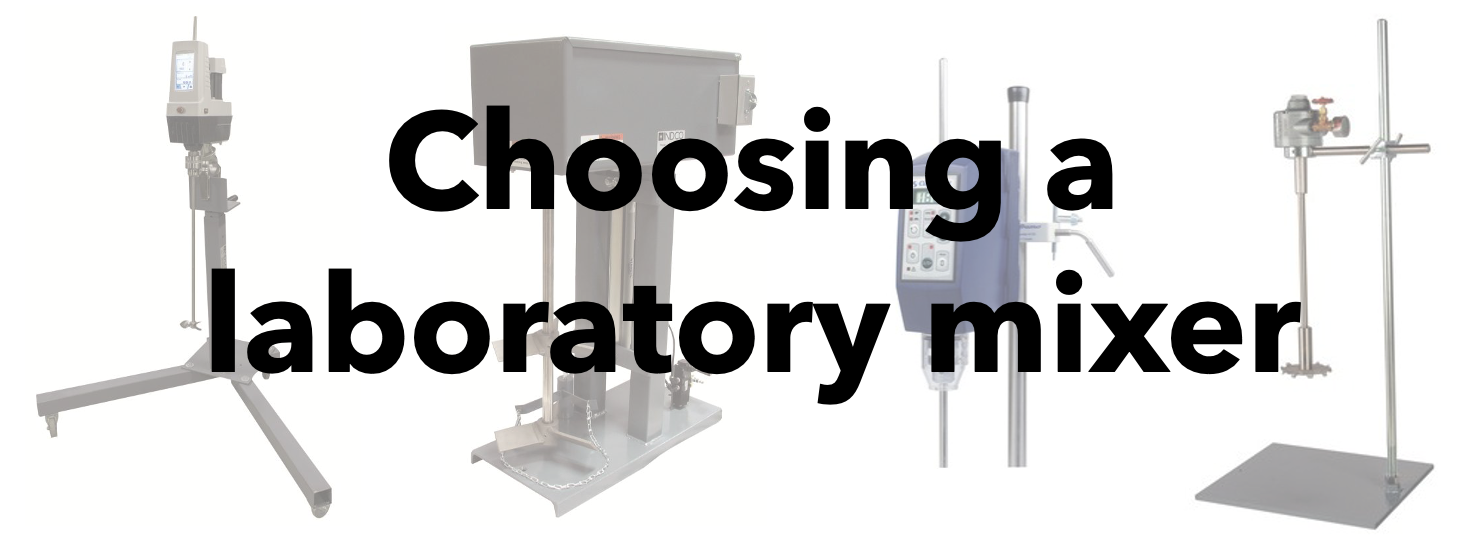Laboratory Mixers: Which One Do I Need?

Selecting a laboratory scale mixer, or “lab stirrer” as they are often referred, can be a confusing task. The prospective buyer has a dizzying number of product options and accessories from which to choose. There are packaged systems which include the stirrer head, stand, mounting bracket and perhaps a few impellers. There is also the a la carte approach where each item is sold separately. If this isn’t confusing enough there are the further options of pneumatic vs. electric, various methods of speed control and an overwhelming number of models with a wide range of speed and torque ratings. Prices are from a couple hundred bucks to well over $1,000. It seems certain that the right one is there somewhere but how do you ever make a choice?
The following is a “high level” but helpful thought process to at least narrow down the candidate stirrer or stirrer system that’s right for you.
Power source:
Selecting the power source (air or electric) can be as simple as replacing what was previously purchased or it can be dictated by the services available in the work area. However, if both air and electrical service are present here are some considerations to aid with the selection:
- Combustibles: Electronically controlled electric stirrers are generally not explosion-proof whereas pneumatic motors are considered intrinsically safe and are widely used where solvents or other potentially hazardous fumes may exist.
- Speed Control: If repeatability and precise speed control is important electric models with integrated touchpad controls are more accurate than air-driven models. Pneumatic models often do not include a tachometer. Even if fitted with a tachometer, swings in RPM resulting from air compression and non-constant torque make air stirrers less precise than electric models for controlling RPM.
Horsepower, Direct-drive vs. Gear-driven and Torque Ratings:
Lab stirrer product offerings are commonly categorized as direct- or gear-driven and listed by horsepower rating, speed range and torque ratings. Some higher end offerings are highly versatile and have a “dual range”.
- Horsepower is directly correlated to the price of the stirrer and dictates its maximum capability for agitating liquids higher than that of water. Products at the low end of the price range (approximately $200-$300) may be as small as 1/80th HP and are only suitable for very low viscosities in small volumes, such as in beakers. Conversely, direct drive models rated at 1/5HP are much more capable of handling somewhat higher viscosities and/or higher volumes of light liquids in volumes up to 30 gallons.
- Direct Drive vs. Gear-Driven and Torque Ratings: Stirrer models with higher torque ratings are always either gear-driven or have a dual range, i.e. a high speed, direct driven range and a lower speed, higher torque range. Higher torque is always associated with the need to mix higher viscosity liquids or slurries. The higher the torque rating, expressed in in.-lbs. for stirrers, the higher the units’ capability to handle viscous batches. Dual speed range units are a practical selection as a general lab stirrer where batch properties can vary widely. These units are also at the high end of the price range with common models from leading manufacturers in the $1,500 range.
Packages, Individual Components and Accessories
- Depending on the manufacturer, lab stirrers and accessories may be available in turnkey kits or require the purchase of individual components. Most kits will include a power head, stand, mounting hardware and a general application impeller such as a small marine style propeller. This may be suitable for many applications but special requirements may dictate the a la carte approach. Requirements to meet sanitary materials standards may dictate stainless steel stands or other accessories not configured in “all-in-one” packages. Specific impellers to achieve a desired process result can also require the purchase of individual items.
With a wide range of features, materials of construction, power and speed control options and general designs available, the above information provides perhaps and initial “filter” to narrow the field of candidate models for your laboratory application. For assistance with selection of the precise lab stirrer suited for your work environment, batch size, industry, and material properties INDCO’s customer service and engineering personnel can perform calculations to ensure your success. Contact us at (800) 851-1049.
